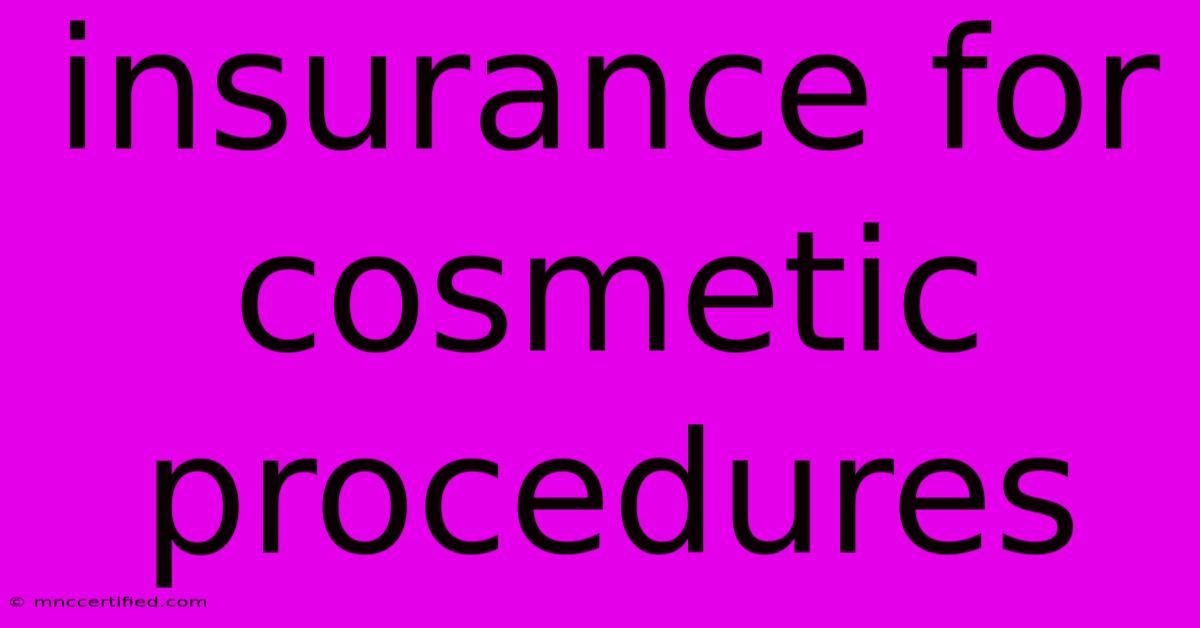Insurance For Cosmetic Procedures

Table of Contents
Insurance Coverage for Cosmetic Procedures: What You Need to Know
Cosmetic procedures are increasingly popular, but the cost can be significant. Many people wonder: does insurance cover cosmetic surgery? The short answer is usually no, but there are exceptions. Understanding the nuances of insurance coverage for cosmetic procedures is crucial before you undergo any treatment. This comprehensive guide will explore the complexities of insurance and cosmetic enhancements, helping you navigate this often confusing landscape.
What is Considered a Cosmetic Procedure?
Before diving into insurance coverage, it's essential to define what constitutes a cosmetic procedure. These are primarily elective procedures designed to improve appearance, rather than address medical necessity. Examples include:
- Botox and Fillers: These injectables smooth wrinkles and add volume, primarily focused on aesthetic improvement.
- Breast Augmentation/Reduction: While breast reduction can sometimes be medically necessary for back pain relief, augmentation is almost always considered cosmetic.
- Liposuction: This procedure removes fat deposits for aesthetic reasons.
- Rhinoplasty (Nose Job): Unless medically necessary to correct a breathing problem, rhinoplasty is usually deemed cosmetic.
- Facelifts and Eyelifts: These procedures target signs of aging, primarily for cosmetic purposes.
When Might Insurance Cover Cosmetic Procedures?
While most cosmetic procedures are not covered, there are limited circumstances where your insurance might contribute:
- Reconstructive Surgery After an Accident or Illness: If you've been in an accident or suffered an illness resulting in facial scarring or disfigurement, reconstructive surgery to restore your appearance might be covered. This is crucial to differentiate from purely cosmetic enhancements. Documentation from your physician outlining medical necessity is essential.
- Reconstructive Surgery After a Medical Procedure: Sometimes, a necessary medical procedure (e.g., mastectomy for breast cancer) results in disfigurement. In these cases, reconstructive surgery to restore the affected area may be covered by insurance. Again, strong medical documentation is vital.
- Treatment of a Medical Condition: If a cosmetic procedure is necessary to treat an underlying medical condition (e.g., correcting a cleft lip or palate), it's more likely to receive insurance coverage.
What to Expect When Filing a Claim
Even if your procedure could potentially be covered, navigating the insurance claim process can be challenging. Here's what you need to know:
- Pre-authorization: Many insurance providers require pre-authorization before any procedure. This involves submitting detailed information about the procedure and its medical necessity to your insurance company for approval. Failure to obtain pre-authorization can result in denied claims.
- Detailed Medical Documentation: Your physician must provide thorough documentation explaining the medical necessity of the procedure, linking it to a diagnosed medical condition or the result of an accident or illness. Vague descriptions will likely result in denial.
- Appeal Process: If your claim is denied, understand your insurer's appeal process. You may need to provide additional documentation or evidence to support your case.
Exploring Financing Options for Cosmetic Procedures
Since insurance rarely covers cosmetic procedures, exploring financing options is crucial. Consider:
- Medical Financing Companies: Many companies specialize in financing medical procedures, offering payment plans with manageable monthly installments.
- Savings Plans: Setting aside funds specifically for cosmetic procedures allows you to pay upfront, avoiding interest charges.
- Credit Cards: While a last resort due to high interest rates, credit cards can provide short-term financing.
Key Considerations Before Undergoing Cosmetic Procedures
- Realistic Expectations: Understand the limitations of cosmetic procedures and avoid unrealistic expectations.
- Choosing a Qualified Surgeon: Select a board-certified surgeon with extensive experience in the specific procedure you're considering.
- Cost Transparency: Discuss all costs upfront, including surgery fees, anesthesia, and post-operative care.
In conclusion, while insurance rarely covers purely cosmetic procedures, understanding the exceptions and navigating the claim process effectively can make a significant difference. Thorough preparation, realistic expectations, and exploration of financing options are crucial for a smooth and financially responsible experience. Remember, always prioritize your health and consult with both your physician and your insurance provider before proceeding with any cosmetic procedure.

Thank you for visiting our website wich cover about Insurance For Cosmetic Procedures. We hope the information provided has been useful to you. Feel free to contact us if you have any questions or need further assistance. See you next time and dont miss to bookmark.
Featured Posts
-
Is Optilight Covered By Insurance
Nov 18, 2024
-
White Jones Aspinall Bout Likely
Nov 18, 2024
-
Injury Setback Maxwell Misses T20 Match
Nov 18, 2024
-
Dp World Tour Mc Ilroys Year End Victory
Nov 18, 2024
-
Week 11 Saints Vs Browns In New Orleans
Nov 18, 2024